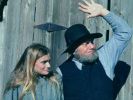Eye For Film >> Movies >> Deadly Blessing (1981) Film Review
One of Wes Craven's most neglected Eighties fear-flicks is actually an important stepping stone in his development towards A Nightmare On Elm Street, featuring the same heady mix of strong female leads, feverish dream sequences and nail-biting suspense. His third 'proper' film - following the harsh extremes of rape revenge opus The Last House On The Left and cannibal chiller The Hills Have Eyes - Deadly Blessing almost boils over with a rich stew of disparate ideas and themes, some half-baked while others are overdone.
For all its flaws though, old-school horror fans should get a kick out of Craven's employment of classic slasher tropes in an unusual setting, not to mention a genuinely spooky James Horner score and the sort of unpredictable barminess that peaks with one of those Carrie-inspired 'gotcha!' endings which were all the rage back then.

The Hittites are a religious community who, like the Amish, shun modern life and consider its technological trappings evil. City-girl Martha lives nearby with her husband, who had to leave the fold to marry her, and soon dies in a tragic accident. When two of Martha's LA girlfriends come to help her through her trauma, it sets off a chain of events among the Hittites leading to superstitious accusations and murder. As Martha tries to figure out what really happened to her husband, a threatening presence closes in, invading the girls' dreams as well as stalking them through their days.
Perhaps one of the reasons Deadly Blessing has fallen through the horror cracks is that it unfashionably shuns the 'video nasty' mentality of many of its contemporaries, focusing instead on developing its characters while building a sense of mystery. To this end there's a memorably doom-laden score blessed with appropriately religious-sounding choral flourishes that lend the action a fabulously ominous atmosphere. Craven also makes good use of the stark countryside and homespun locations, making the superficially welcoming seem sinister by emphasizing Martha's isolation, in both societal and geographical terms.
The film's finest set-piece is all the better for deceptively starting from a point of bright sunlight, expertly orchestrated to play on several phobias simultaneously. Interestingly, the murderer appears in pretty much exactly the same garb - and is every bit as comically useless - as Scream's iconic Ghostface, only without the Munch mask and annoying voice. It's intriguing to see how many of Craven's later tricks are successfully executed here, including a bathtub menace that the director cannibalised himself on Elm Street.
Most notably, the aforementioned night terrors have the characters in helpless somnambulistic states while being molested by a whispering shade with an oral fetish that will give anyone who believes that urban legend about eating spiders in their sleep nightmares for life. It all leads to an utterly demented climax where a series of ridiculous revelations crash the story from out of nowhere, the string of red herrings offering little preparation for the barely signposted actuality (at its core the film bears all the hallmarks of one of Argento's giallo hits, right down to narrative incoherence).
Many will find the film's denouement an unnecessary and shoddily executed epilogue - indeed, Craven himself has expressed his dissatisfaction, having been pressured into filming it by the studio - but it's totally in keeping with the loon-ball charm of what's gone before, adding another layer of ambiguity just as you're led to believe everything's been explained.
Religious horror is always good for eyeball-bulging, scenery-chewing nuttiness; here, Ernest Borgnine is brilliantly over-the-top and intense as the head of the Hittites. He manages to convey grief, anger and genuine piety while still giving good gurn, enlivening every scene he appears in. The script gets good mileage from his intimidation tactics and hypocritical preaching, setting his flock up as a breeding ground for the sort of maniac in their midst. Cult horror fans will also enjoy Michael Berryman's brief and uncharacteristically sympathetic supporting role, playing a repressed man-child with a voyeuristic streak.
Lead actress Maren Schmidt impresses through her convincing resilience and no-nonsense attitude; it's refreshing to see a female character defending their home and their right to live there. Susan Buckner is also effective as her bubbly friend from the real world, even investing her culture clash dalliance with Jeff East's hesitant Hittite with some real tenderness and a romantic sense of spontaneity. The rest of the supporting cast is primarily made up of women too, each of them bringing a knowing touch to their roles without spilling over into parody.
The film is perhaps best known now as one of Sharon Stone's first big-screen outings, so it's both a cringe-worthy guilty pleasure and a slight disappointment to see her so wooden and lacking the feisty appeal we know she would come to make her trademark. For all that, though, the film is helped tremendously by its varied and enthusiastic ensemble, stoking the audience's imagination for who might be involved in the nefarious goings-on among the hay-bales.
The whole storyline is hopelessly convoluted in that classic whodunnit style; events get endearingly daffy the further the film goes but it's all the more fun for it. The commentary on religious mania is also nicely balanced, with the order shown to be an oppressive and contradictory establishment but their people also painted as resolutely human with behaviour we can all relate to as well. All of this may appear dated to modern viewers, but as a piece of unholy hokum Deadly Blessing is a bit of a buried treasure, which will hopefully find some new fans thanks to this attractively packaged Arrow presentation.
It's a unique little rogue that's one of Craven's most under-appreciated works; anyone in the mood for some old-fashioned thrills would do well to seek it out.
Reviewed on: 22 Dec 2011

















